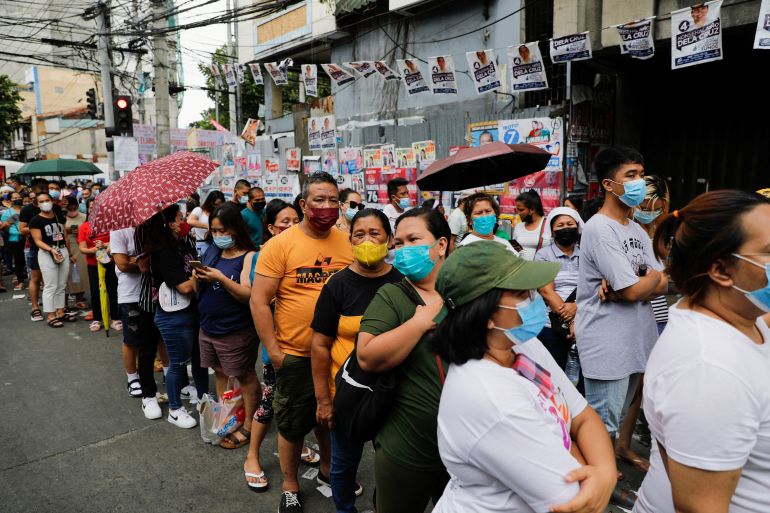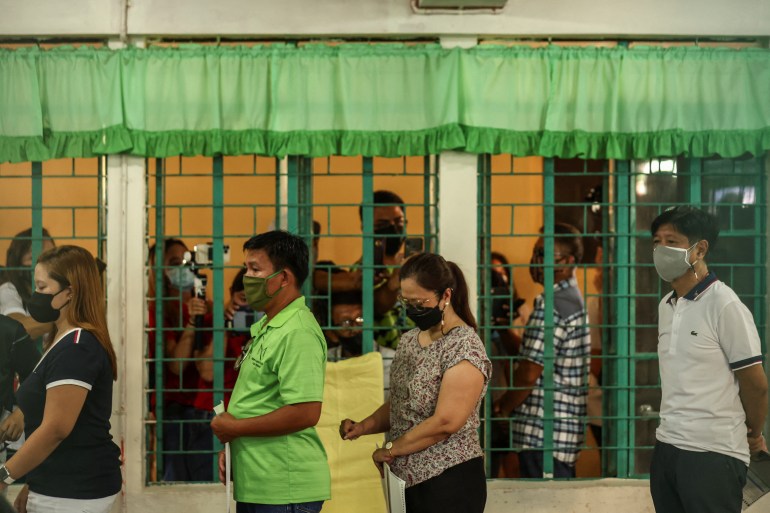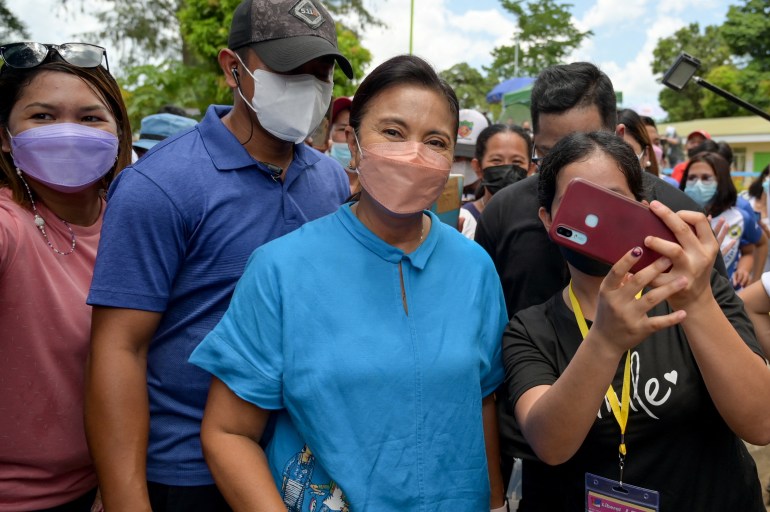Philippines election: Polls close in historic vote for president
Top contenders in Monday’s vote are Ferdinand Marcos Jr, son of the Philippines’ late dictator, and the current Vice President Leni Robredo.

Naga City, Philippines – Millions of Filipinos voted on Monday to choose a new president in an election pitting the son of the Philippines’ late strongman against a liberal human rights lawyer.
Polls closed across the Southeast Asian nation at 7pm (11:00 GMT), with a record-breaking 67 million people registered to cast their ballots. There will be no second round.
Keep reading
list of 4 itemsMarcos Jr wraps up Philippine election campaign as win expected
Philippines 2022: Authoritarian nostalgia vs hopes of reform
Philippines election: Is democracy at stake?
Elections Commissioner George Garcia told reporters early Monday that he expected a huge turnout.
“It’s a historic election, a very memorable one, simply because we’d be electing, at least in a pandemic situation, a new president and that’s why we’re expecting a high turnout of voters,” he said before the polls opened.

Polls officially closed at 7pm, but election authorities said those waiting in line would be allowed to vote after the deadline.
The counting of ballots was supposed to begin right away, but unconfirmed reports on social media suggest that the election had been marred by delays and possible discrepancies.
Voting stations across the Philippines have reportedly been unable or slow to scan paper ballots, leading some Filipinos to fear that their votes will not be counted after they were told to leave them with officials. Others allege that vote-buying, manipulation and even violence have been used to sway voters.
Voting machines have malfunctioned in many places, but an elections commissioner said these were anticipated. There is a serious mismatch in what is (officially) said and what’s happening on the ground.
— Guy With A (Hibernating) Blog (@GuyWithABlog) May 9, 2022
Two-way race
Analysts have described Monday’s vote as the most significant election in recent Philippine history as the outcome could result in either democratic backsliding or in liberal reforms.
The contest has become a two-way race between Ferdinand “Bongbong” Marcos Jr and the current Vice President Leni Robredo. The pair had previously faced off in the vice presidential race in 2016, with Marcos losing to Robredo at the time.
But opinion surveys show Marcos Jr leading this time. He is the son and namesake of his father who ruled the Philippines as a dictator until he was forced from office and into exile in a popular uprising in 1986.
On the campaign trail, Marcos Jr referred to “unity” but provided little detail on his policies. He has hailed his late father’s “genius” leadership, and avoided media interviews and debates.

Robredo, a lawyer who heads the opposition, has promised to form a more transparent government and reinvigorate the country’s democracy.
She threw her hat into the ring at a relatively late stage and has relied on a network of pink-clad volunteers to win over voters across the archipelago.
“This election is really a ‘good versus evil’ campaign,” University of the Philippines Diliman political scientist Aries Arugay told Al Jazeera. “It’s quite clear. [Marcos] represents dynasty, autocracy and impunity. Robredo stands for the opposite of that: integrity, accountability and democracy.”
Marcos Jr’s running mate in the election is the outgoing president’s daughter, Sara Duterte-Carpio. She is leading the race for the vice presidency, an election that is held separately.
Filipinos are also choosing members of the congress, governors and thousands of local politicians, including mayors and councillors.
Long lines
The excitement in the Philippines has been high since polls opened. By midday Monday, social media was flooded with posts by Filipinos showing a finger covered in ink – a sign they had voted – often accompanied by messages like “God Bless the Philippines.”
Many shared photos of long, hot queues at polling stations and the challenges they went through to vote, like waking up before dawn to stand in line or even flying home for the occasion.
First time voting!
Waking up at 3am and lining up at 4:30am was all worth it!
God Bless Philippines!
❤️💚❤️💚 pic.twitter.com/gvCmIpp061— sheervy myra booc (@sheervymyra) May 9, 2022
Flew back to Philippines last May 7, woke up at 6 am today from Parañaque to Dasma.
Waited in line for almost 3 hours under the heat.
Para sa bayan. 💖🌸 https://t.co/0wwnebAtB5
— Karl Funtanares (@KarlFuntanares) May 9, 2022
Overseas Filipinos like Dada Docot, an anthropologist at Tokyo College in Japan, were also keen to participate in the vote after watching events unfold at home.
She told Al Jazeera she posted her ballot on May 2, and she hopes today’s election will overturn a three-decade political dynasty occupying the mayor’s seat in her hometown.
She is also deeply concerned about the future of the presidency.
“I’m feeling really anxious. I’m hoping for the opposition on both the local and national government level to win,” Docot said.
“I couldn’t vote in the last elections because of uncertainty in my overseas location for work, but I try to vote when I can. I feel more invested this time. We are scared of Marcos Jr coming back to power, especially paired with Sara Duterte,” she also said.
Elsewhere, overseas Filipinos cast their votes in person on Monday.
In Taiwan, Gino Lopez, a university student and volunteer poll watcher at the Philippines representative office, said approximately 75,000 Filipinos – many of them foreign workers – were registered to vote. The vast majority were expected to choose Marcos Jr, he said.
“I hope foreign media don’t get the impression that all Filipinos support Marcos, despite what the polls show,” Lopez said.
As a Robredo supporter, he attributed the popularity of Marcos among foreign workers to a combination of fake news, extensive image rehabilitation, and the family’s support for overseas workers’ assistance programs.
He also said the office had to disqualify a number of ballots on Monday that were either unsigned or appeared to have identical signatures.
Candidates square off
As a study in contrasts, Marcos voted early Monday in his father’s hometown of Buntac, while Robredo skipped the tradition of VIP treatment for candidates. Instead, the incumbent vice president queued for nearly two hours to vote in Magarao, a poor municipality outside Naga City in Southern Luzon, where her family owns property.
One voter at Robredo’s polling station told Al Jazeera they were voting for her because they are concerned about the future of human rights and democracy.
But for others, economic livelihood is their key priority. The area is frequently in the path of natural disasters like typhoons and earthquakes, and residents are constantly rebuilding buildings and infrastructure.
Earlier on Monday in Naga City, polls opened with a prayer.
“Vote counting machine, please be good to us,” an election official said as she prayed before starting the machine that will be used to record and transmit the ballots.
Then, a bell rang to signal the opening of polls and the voters started coming in.
Outside the polling station, Maria Fe Cortes, 51, patiently waited in line for her turn.
“I’m voting for change. I hope the next president will help the poor,” Cortes told Al Jazeera.
Anthony Esguerra reported from Naga City in the Philippines. Erin Hale reported from Taipei, Taiwan.